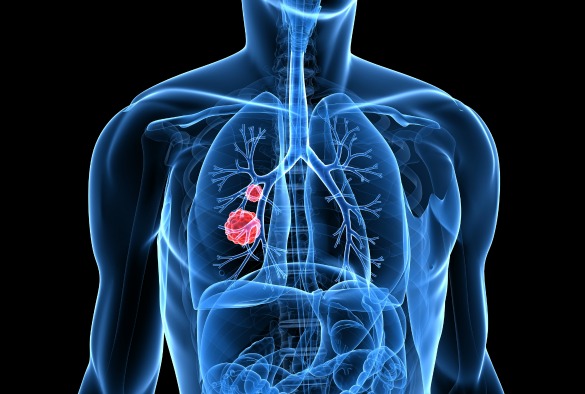
The Liverpool Lung Project (LLP), a long-term research project run by the University with support from Roy Castle Lung Cancer Foundation, provided key data to drive forward the lung health check schemes announced by NHS England today (Friday, 8 February 2019).
Lung cancer scanning trucks that operate from supermarket car parks are being rolled out across the country in a drive to save lives by catching the condition early.
NHS England is investing around £70 million to fund 10 projects that check those most at risk, inviting them for an MOT for their lungs and an on the spot chest scan that include mobile clinics, as well as at certain hospital sites.
NHS England The targeted screening will help improve survival rates by going first to the some of the areas with the highest death rates from lung cancer.
Liverpool has one of the highest mortality rates for lung cancer in England, and it’s also estimated that there’s around 6,000 people living with undiagnosed COPD across the city.
Pioneering pilot scheme
In 1993, the Roy Castle Lung Cancer Foundation awarded a grant to Clinical Professor of Molecular Oncology John Field, from the University’s Institute of Translational Medicine, to study genetic changes in lung cancer and thus laying the groundwork for screening of high-risk individuals.
This work also formed the basis for the LLP , a project that ran from 1996 which used epidemiological techniques to develop a risk model which could help identify individuals at high risk of developing lung cancer. The result of this work was used by Professor Field as he led the pilot UK Lung Cancer Screening Trial (UKLS).
Following the publication of the UKLS trial data, the Liverpool Clinical Commissioning Group (CCG) made a major investment into the Liverpool Healthy Lung Programme and successfully identified individuals from the hard to reach communities and offered them Lung CT scans, identifying early stage disease with a very high proportion suitable for surgical intervention.
The successful results of this programme positively impacted the rollout of this initiative which has the potential to reach around 600,000 people over four years, detecting approximately 3,400 cancers and saving hundreds of lives across the country.
‘Significant achievement’
The NHS Long Term Plan set out an ambition that 55,000 more people will survive their cancer – to achieve this the plan also included an ambition to increase the number of cancers diagnosed at stages one and two from half to three-quarters of cancer patients.
Professor John Field, said: “The University and the Roy Castle Lung Cancer Foundation can take great pride in this announcement from NHS England today. It is a significant achievement in terms of public health policy and has the potential to save thousands of lives across England, improve the quality of life for many more people whose serious conditions will be detected earlier when more treatable, and save NHS England money in the process.“
Paula Chadwick, chief executive of Roy Castle Lung Cancer Foundation, said: “We welcome today’s announcement confirming the roll out of 10 lung health check projects across England. Given our own first-hand knowledge of these programmes, coupled with the staggering results from the NELSON trial which saw a 26% reduction in mortality when high-risk patients had a CT scan, this is a big step forward in improving the early detection of lung cancer.”
Cally Palmer, national cancer director at NHS England, said: “Catching more cancers early is a cornerstone of the NHS Long Term Plan to save a further 55,000 lives a year and targeted lung health checks is one of the first projects to roll out following publication.
“These new projects will save lives – early diagnosis for cancer is crucial as it is easier to treat, not only saving lives, but it will also mean thousands of patients will avoid life changing treatments.”
Detecting a range of conditions
NHS is initially extending the programme to ten new areas across the country at a cost of around £70 million over four years.
The projects will not just identify more cancers quickly but pick up a range of other health conditions including chronic obstructive pulmonary disease (COPD).
The scheme means people aged 55-74 who have been identified as being at increased risk of lung cancer will be invited for a lung health check and be offered a chest scan if appropriate – this scan could take place in a mobile unit or in a hospital setting.
The new projects will last initially for four years and NHS England will then evaluate the results to use as a basis for further roll out. One of the ten areas will be the Cheshire and Merseyside Cancer Alliance which is comprised of Knowsley CCG and Halton CCG.
Most, but not all schemes will use mobile scanning units, this will be dependent on local need – one scheme currently piloting in Liverpool targets clinics in various areas of the city and, where needed, patients are referred to hospital for a scan. Over two years they have they have found and treated more than 40 new cases of lung cancer, with over 75% at an early stage of the disease, when typically 70% of lung cancer cases are not diagnosed until a late stage in Liverpool, when treatment is more difficult.
London’s first mobile unit opened at the end of last year, and is currently moving between supermarket car parks. Over 7,000 Londoners expected to be invited for a lung health check-up through the scheme.
More information can be found here.